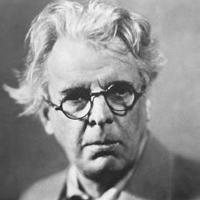Leda and the Swan by William Butler Yeats: Introduction
This sonnet, which was written in 1923, is one of the most perfect poems ever written by Yeats. This perfection was reached not initially but after at least six revisions and modifications. It is an amalgam of history, myth and vision. The poet has compressed within a narrow compass vast immensities and this fact has lent vigor and charm to the composition.

William B. Yeats (1865-1939)
The savage and brutish tone of the poem bears the influence of Synge who holds that before poetry can be human again it must learn to be brutal. So, the poem narrates in near-naked words the sexual atrocity perpetrated by Zeus on delicate Leda.
Leda and the Swan is a great and complex sonnet, probably based on a Michelangelo painting. The quality of violent sexual passion is forcefully conveyed in the poem. At the same time the Greek myth is effectively used, to pose an important question about the frequently alleged cleansing and reviving power of revolution and violence. The fall of Troy is referred to in the sextet because, after her rape by Zeus, Leda gave birth to Helen.
Leda and the Swan is a symbolic poem based on WB Yeats' personal philosophy about history. It is a sonnet. The first part of the poem (the octave) is divided in two quatrains, and the sestet is unusually broken in the middle of the third line. In the first quatrain, the poet describes the rape of the Greek queen Leda by the god Zeus in the form of a wild swan. In the second quatrain, he indirectly suggests that she could not resist and overcome the forceful rape of the wild swan-god. In the first part of the sestet, the poet says that the seeds of the coming violence of the Trojan War were sown in the conception by the swan with Leda (the conception of Helen and her sister). The burning of the Trojan city and the death of Agamemnon were all determined by this rape. In the second part of the sestet, he indirectly suggests that Leda could not conceive (get) the wisdom of the god along with his three and violence. This means that Leda had conceived the violent physical kind of quality from the physically violent rape. Unlike the spiritual conception of Christ on Mary by God's spirit, this conception was violent, and therefore it brought about the civilization of force and violence. The poem must be taken as describing Yeats' philosophy of history.
Cite this Page!
Sharma, K.N. "Leda and the Swan by William Butler Yeats: Introduction." BachelorandMaster, 5 June 2017, bachelorandmaster.com/britishandamericanpoetry/leda-and-swan-introduction.html.
Related Topics
Sailing to Byzantium: Analysis
The Theme of Immortality in Byzantium Poems
The Scholars: Critical Analysis
A Prayer for My Daughter: Analysis
Among School Children: Analysis
Crazy Jane Talks with the Bishop
The Lamentation of the Old Pensioner
He Wishes for the Clothes of Heaven
An Irish Airman Foresees his Death
When You Are Old: Summary and Analysis
William Butler Yeats as a Symbolist
Truth of Human Life in Yeats's Poetry
Yeats and the Romantic Tradition
The Salient Features of Yeats's Poetry
Biography of William Butler Yeats
 |
bachelorandmaster.com |